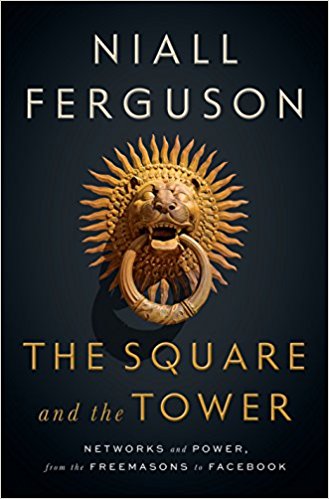You have /5 articles left.
Sign up for a free account or log in.
 The Square and the Tower: Networks and Power, from the Freemasons to Facebook by Niall Ferguson
The Square and the Tower: Networks and Power, from the Freemasons to Facebook by Niall Ferguson
Published in January of 2016.
In The Square and the Tower, historian Niall Ferguson embraces sociological network analysis with the passion of the converted. This is no bad thing. A network framework provides a powerful set of analytical tools. Combine network thinking with Ferguson’s vast historical knowledge and his skills as a lively writer, and you end with the enjoyable and thought provoking read that is The Square and the Tower.
The question of is Ferguson a bit too enamored with his observation that networks often matter more hierarchies is one that each reader will need to decide for themselves. Perhaps I’m a victim of too many years of sociological training, but I came away from The Square and the Tower will less insights than one might reasonably expect in 592 pages. (Or in my case 17 hours and 21 minutes, the length of the excellent audiobook, beautifully performed by the London born Elliott Hill).
Throughout the book, Ferguson’s command of historical personalities and events is often on display. The narrative sometimes feels, however, as if Ferguson was writing about the history that he knows - while devoting his mental energy into viewing that history through a network analysis lens. The result is a far-ranging historical tour, from the origins and meaning of the The Illuminati to the life Henry Kissinger, with stops in between for discussions of terrorism and spies and economic history and Facebook.
Ferguson’s whirlwind historical tour is never boring. The book is made more enjoyable by the fact that Ferguson is willing to share his opinions and biases about the people and events that we encounter. His attempt, however, to build up a new network-centered historical perspective never quite gels. This may be due to The Square and the Tower beyond a work of popular fiction. This is a book written for the airport crowd, and Ferguson is smart to keep his chapter short and his observations pithy. Those looking for deeper or more systematic analysis will need to look elsewhere.
The instances when Ferguson attacks the Obama presidency in The Square and the Tower are amongst the least strong in the book. Not because it is wrong that a historian should be critical of a president. But rather because Ferguson can’t seem to be bothered to lay out a strong case, with supporting evidence, for the shortcomings of the last administration.
That being said, and despite my criticisms, I would argue that The Square and the Tower is worth your time. Say what you will about Ferguson, but he writes with a fluidity and erudition that the rest of us can only envy. He has interesting things to say, even if we don’t always agree with his conclusions, and even if we wish he had been more disciplined and focused in the telling.
Good books can be books that we disagree with, and books that we wish at times had taken a different approach.
Given a choice between doing almost any other non-book reading activity, I’d argue that investing your time in reading The Square and the Tower is a defensible course of action. And if your network convinced you to give the book a try, then perhaps Ferguson is really on to something.
What are you reading?




